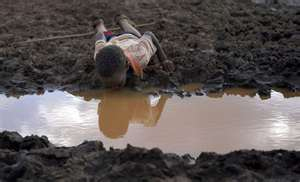 The UN food agency FAO will host emergency talks on the Horn of Africa drought crisis in Rome on Monday as aid groups scramble to raise money for an estimated 12 million people on the brink of starvation. UN secretary general Ban Ki-moon has called on donor countries to come up with $1.6 billion (1.1 billion euros) in aid for two regions of southern Somalia that were declared famine zones by the United Nations this month.
The UN food agency FAO will host emergency talks on the Horn of Africa drought crisis in Rome on Monday as aid groups scramble to raise money for an estimated 12 million people on the brink of starvation. UN secretary general Ban Ki-moon has called on donor countries to come up with $1.6 billion (1.1 billion euros) in aid for two regions of southern Somalia that were declared famine zones by the United Nations this month.
“This is an emergency ministerial meeting that is prompted by the escalation of the famine,” said Cristina Amaral, head of emergency operations in Africa for the Food and Agriculture Organisation (FAO) in the Italian capital.
“We’re afraid that things will get worse in the coming months if nothing is done now. The main aim of the meeting is to call the political attention of leaders of the world,” said Amaral, who is helping to organise the talks.
Among the attendees expected will be FAO director Jacques Diouf, the head of the World Food Programme Josette Sheeran, Oxfam chief executive Barbara Stocking and ministers from Djibouti, South Sudan, Sudan and Uganda.
International aid agencies are scrambling to find ways to deliver food supplies to millions of people living in the epicentre of the famine in parts of Somalia controlled by the al Qaeda-inspired Islamist group Shebab.
The World Food programme was forced to leave southern Somalia last year following a series of curbs and threats from the Shebab.
The militants this month said foreign aid groups could return to the area but on Friday a Shebab spokesman said the ban was still in place.
UN workers have said they will continue to try to work where they can.
The UN children’s fund Unicef has already made one delivery of five metric tonnes of food and medicine to the insurgent-controlled town of Baidoa.
The UN says tens of thousands of people have been killed by the worst drought in 60 years, which has wreaked havoc in war-torn Somalia but has also hit more widely in parts of Djibouti, Ethiopia, Kenya, Sudan and Uganda.
Experts say the effects of two failed rainy seasons in the region have been exacerbated by the rapid rise in the costs of fuel and food and the conflict in Somalia and have forced hundreds of thousands of people to flee their homes.
Long-term solutions for the crisis — such as assistance to livestock farmers, the introduction of more drought-resistant crops and measures to control food price volatility — are also set to be discussed at the meeting.
The talks were called by the French presidency of the G20 leading world economies and will be attended by French agriculture minister Bruno Le Maire.
France said that the talks should aim to “coordinate the international response to this crisis in the short and medium-term.”
WFP director Sheeran visited Mogadishu on Thursday and promised her agency would begin airlifts of food aid into the Somali capital “within days”.
Sheeran then toured the Dadaab camp in northern Kenya — the biggest refugee camp in the world — on Saturday along with Le Maire and Diouf.
European Union aid commissioner Kristalina Georgieva also visited the camp on Saturday and promised to boost aid by 27.8 million euros ($40 million).
The funds come on top of 70 million euros the bloc has already contributed.
The total number of Somali refugees that have fled to Ethiopia and Kenya in recent weeks to escape starvation is estimated at more than half a million.
In a report for the meeting, FAO pointed to food prices as a key factor.
FAO researchers found that maize and red sorghum were being sold in Mogadisuhu last month at record prices of $660 and $670 per ton respectively — increases of 106% and 180% on an annual basis.
They also said that expected above-average rainfall would provide some relief for crop producing parts of Ethiopia, Kenya and Sudan but that the situation for livestock herders in Somalia was likely to worsen.